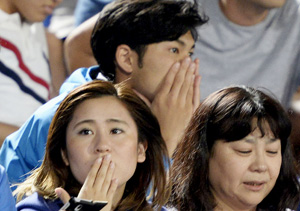Tokyo, May 30: A 7.8-magnitude earthquake struck off the Japanese coast today, geologists said, shaking buildings in Tokyo and setting off car alarms.
Despite the huge power of the quake, there was no risk of a tsunami, The Pacific Tsunami Warning Centre reported.
Residential buildings swayed for around a minute as the quake built in intensity at around 8.30pm (1130 GMT), an AFP correspondent reported.
There were no immediate reports of injuries or damage.
The epicentre was 676 kilometres below the Earth's surface. It was centred on a remote spot in the Pacific Ocean around 870 kilometres south of Tokyo, the US Geological Survey said.
Yoshiyuki Sasamoto, who runs a traditional guest house on Chichijima, one of the closest inhabited places to the epicentre, told NHK the shaking had been violent.
"Initially a weaker quake hit and it stopped. Then the big one came. It was so strong that I couldn't stand still and couldn't walk," he said.
Both runways at Narita Airport, the main international gateway to Tokyo, were temporarily closed while inspections were carried out. Trains in Tokyo were also temporarily halted and a football match in the city was briefly suspended.
There were no reported abnormalities at any of the region's mothballed nuclear power plants.
A massive undersea quake that hit in March 2011 sent a tsunami barrelling into Japan's northeast coast.
As well as killing thousands of people and destroying communities, the waves also swamped the cooling systems at the Fukushima nuclear plant, sending three reactors into meltdown.
The nuclear disaster, the world's worst since Chernobyl, displaced tens of thousands of people and rendered tracts of land uninhabitable, possibly for decades.
Today's rattle was the second sizable shake Tokyo has had this week, after a much less powerful -- but far shallower -- quake hit close to the capital on Monday.
Japan sits at the meeting place of four tectonic plates and experiences around 20 per cent of the world's most powerful earthquakes every year.
Yesterday a volcano in the far south of Japan erupted, spewing a huge column of ash high into the sky and forcing authorities to evacuate the island on which it sits.
The eruption caused no injuries and no damage was reported, but it served as yet another reminder of the volatile geology of the country.






Comments
Add new comment